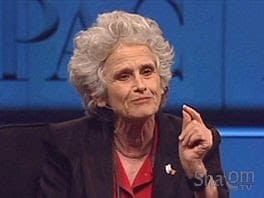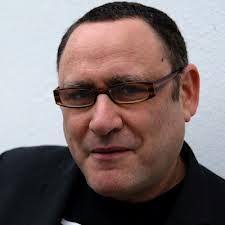
One of the main differences between my work and and the writings of other humanists within the peace movement is that I am willing to move beyond the political discussion — I dig into the ideological and philosophical roots of the Jewish state, Jewish politics and Jewish identity politics. I look into the meaning of ‘Jewishness.’
In my work I clearly identify a continuum between Israel and ‘Jewish ideology’ (‘Jewishness’). And since Israel defines itself as the Jewish State, then surely –we must be brave enough to question what Jewishness stands for.
And clearly, Israelis are proud about their Jewishness — They are far from being shy about it all.
In the following video Judeo-Centric Israeli Law Professor Ruth Gavison spreads some Jewish Tribal ideas at AIPAC conference.
Ruth Gavison on Israel’s Future as a Jewish State-Shalom TV
[youtube GrpClg2Tn4A]
If you fail to understand what motivates the Israeli pilots to drop bombs on civilians from aeroplanes decorated with Jewish symbols, law professor Gavison provides the answer;
“Israel will do whatever it takes to remain a Jewish state for as long as it takes.”
If you ask yourself, how is it that 94% of Israeli Jews supported the IDF genocidal measures at the time of Operation Cast Lead, then Gavison may have some insights to offer.
“The Jewishness of Israel is the meaning of which the state of Israel is enabling Jews for the first time in many years, to take control of all aspects of their lives”
They certainly do: Israeli brutality is beyond comparison.
Gavison concludes, “Israel is the place where Jewish and Hebrew culture is the majority culture; this is the meaning of the Jewishness of Israel”
We have to agree with the Law Professor — Hebrew culture is, indeed, a majority culture in Israel — because the indigenous people of the land are locked behind walls in open air prisons.
If Israel is the meaning of Jewishness, and vice versa, Jews do have a serious ethical problem to deal with.

Gilad Atzmon is an Israeli-born British jazz saxophonist, novelist, political activist and writer.
Atzmon’s album Exile was BBC jazz album of the year in 2003. Playing over 100 dates a year,[4] he has been called “surely the hardest-gigging man in British jazz.” His albums, of which he has recorded nine to date, often explore the music of the Middle East and political themes. He has described himself as a “devoted political artist.” He supports the Palestinian right of return and the one-state solution in the Israeli-Palestinian conflict.
His criticisms of Zionism, Jewish identity, and Judaism, as well as his controversial views on The Holocaust and Jewish history have led to allegations of antisemitism from both Zionists and anti-Zionists. A profile in The Guardian in 2009 which described Atzmon as “one of London’s finest saxophonists” stated: “It is Atzmon’s blunt anti-Zionism rather than his music that has given him an international profile, particularly in the Arab world, where his essays are widely read.”
His new book The Wandering Who? is now availble at Amazon.com
ATTENTION READERS
We See The World From All Sides and Want YOU To Be Fully InformedIn fact, intentional disinformation is a disgraceful scourge in media today. So to assuage any possible errant incorrect information posted herein, we strongly encourage you to seek corroboration from other non-VT sources before forming an educated opinion.
About VT - Policies & Disclosures - Comment Policy



